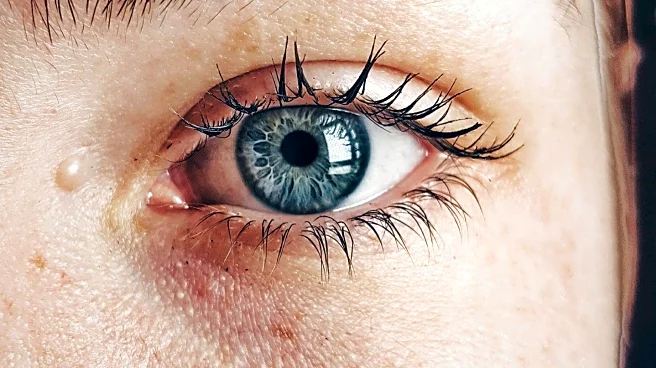What's Happening?
Researchers at McMaster University and the Population Health Research Institute have discovered that the small blood vessels in the eye can provide insights into a person's biological aging and risk of
heart disease. The study, published in Science Advances, suggests that retinal scans could become a non-invasive method to assess vascular health and aging. By analyzing retinal images, genetic data, and blood biomarkers from over 74,000 participants across four global cohorts, the researchers found that individuals with less branched retinal blood vessels faced higher risks of cardiovascular disease and showed signs of faster aging, such as increased inflammation and reduced lifespan potential. The study also identified proteins linked to inflammation and vascular aging, which could be targets for future drug development.
Why It's Important?
This research is significant as it proposes a potentially simpler and more accessible method for assessing cardiovascular risk and aging through retinal scans. Currently, diagnosing age-related diseases like heart disease and stroke requires multiple tests, but retinal scans could streamline this process, making preventive care more efficient. The identification of proteins associated with vascular aging opens avenues for developing drugs that could slow down aging and reduce cardiovascular disease burden, potentially improving lifespan. This advancement could have substantial implications for public health, offering a new tool for early detection and intervention in age-related health issues.
What's Next?
The findings suggest that further research and development are needed to refine retinal scanning technology for widespread clinical use. Researchers may focus on validating the effectiveness of retinal scans in diverse populations and integrating this method into routine health assessments. Additionally, the study's identification of specific proteins as drug targets could lead to the development of new treatments aimed at slowing vascular aging. Collaboration between researchers, healthcare providers, and pharmaceutical companies will be crucial in advancing these discoveries from research to practical applications in healthcare settings.
Beyond the Headlines
The study highlights the potential for retinal scans to revolutionize how aging and cardiovascular risks are assessed, offering a non-invasive and accessible option. This could lead to a shift in healthcare practices, emphasizing preventive measures and early intervention. The ethical implications of using genetic and biomarker data for health assessments also warrant consideration, particularly in terms of privacy and data security. As retinal scanning technology advances, it may also prompt discussions on healthcare equity, ensuring that such innovations are accessible to all segments of the population.











